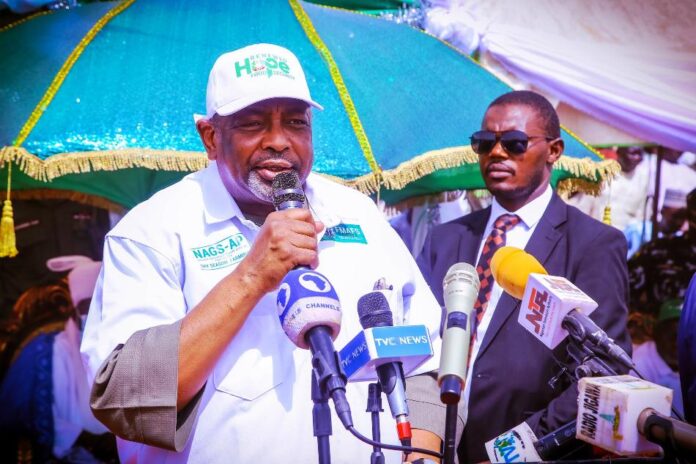
In a proactive move to tackle food insecurity, inflation and respond to President Bola Ahamed Tinubu’s emergency declaration on food security, the Federal Ministry of Agriculture and Food Security has flagged off the 2023/2024 dry season wheat farming under the National Agricultural Growth Scheme and Agro Pocket (NAGS-AP) project, with target of an expected yield of 1,250,000 tonnes of wheat production per year. The Programme would reduce food inflation, increase production, promote self-sufficiency as well as stimulate economic growth.
Speaking during the Flag-off ceremony in Kadume, Hadejia Local Government Area, Jigawa State, recently, the Minister of Agriculture and Food Security, Sen. Abubakar Kyari, CON, stated that “as part of the initiative, Federal Government aim to support about 150,000 to 250,000 farmers with 50% input subsidy to cultivate between 200,000 to 250,000 hectares and an expected yield of 1,250,000 tonnes of wheat”.
The Minister revealed that, “the dry season farming is an integral part of the National Agricultural Growth Scheme and AgroPocket (NAGS-AP) Project, made possible by a $134 million loan facility advanced to Nigeria by the African Development Bank (AfDB) and encapsulates, this Administration’s resolve to expand the capacity of our farmers to engage in the cultivation of key staples like rice, maize, cassava and wheat, across the country.”
The Minister pointed out that the Program would be Technology enabled, thus guaranteeing transparency and accountability in the provision of the subsidy and other support services like; extension, insurance and additional finance.
According to him, “the farmers will be guaranteed access to improved seeds – in this particular instance, I would like to point out that we are deploying heat tolerant wheat varieties like Borlaug 100; Attila among others”.
Sen. Kyari emphasized that the Federal Government would progressively invest in irrigation infrastructure projects to optimize water usage and mitigate the challenges posed by dry season.
He further said that “we have been innovative in utilizing information and communication technology to: target already proven irrigated farm clusters, deploy verified farmer data and map the farmers to agro dealer Redemption centers, and thankfully, we have already gained grounds”.
He appealed to the relevant stakeholders, private sector and civil society to seize the opportunity of the 2023/24 dry season farming initiative to usher in a new era of agricultural prosperity and ensure brighter future for Nigerians.
“Together, we can transform our challenges and pave the way for a sustainable and food secure nation, let us dare to renew our hope”, he said.
In his remarks, the Executive Governor of Jigawa State, Mallam Umar Namadi stated that the initiative perfectly aligns with several aspects of the State 12-Point Agenda for Greater Jigawa particularly as it affects food security, economic diversification, job creation, provision of sustainable means of livelihoods for the citizens, and overall poverty reduction.
He expressed optimism that the capacity of over 42,000 smallholder farmers would be significantly expanded through their participation in the Program as each of them would be provided with input subsidy support granted by the Federal Government equivalent to 50% of the estimated cost of packaged input requirements amounting to about N361, 000 per hectare.
He therefore urged the Federal Government to accelerate the completion of the Hadejia Valley Irrigation Project which was initiated by the Late Shagari Administration in the early 1980s, with potential irrigable area of over 25,000 hectares and a capacity to significantly deliver the Food Security objective of President Tinubu’s Renewed Hope Agenda.
Earlier in his remarks, the National Project Coordinator, (NAGS-AP) Isayku Buba stated that the Program would be technology enabled in order to guarantee transparency and accountability in the provision of the subsidy and other support services like extension, insurance among others.
The highlight of the event was the distribution of Agricultural Inputs and Display of Brand New Tractors
Obe M. Mabel
Principal Information Officer
For Director: Information (FMAFS)





